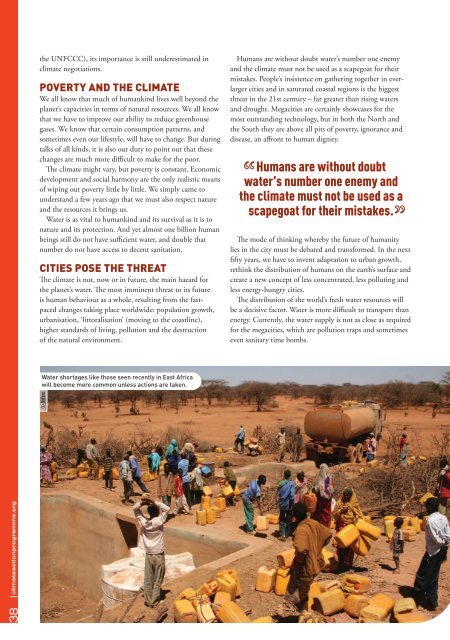Climate Action 2011-2012
You also want an ePaper? Increase the reach of your titles
YUMPU automatically turns print PDFs into web optimized ePapers that Google loves.
the UNFCCC), its importance is still underestimated in<br />
climate negotiations.<br />
Poverty and the <strong>Climate</strong><br />
We all know that much of humankind lives well beyond the<br />
planet’s capacities in terms of natural resources. We all know<br />
that we have to improve our ability to reduce greenhouse<br />
gases. We know that certain consumption patterns, and<br />
sometimes even our lifestyle, will have to change. But during<br />
talks of all kinds, it is also our duty to point out that these<br />
changes are much more difficult to make for the poor.<br />
The climate might vary, but poverty is constant. Economic<br />
development and social harmony are the only realistic means<br />
of wiping out poverty little by little. We simply came to<br />
understand a few years ago that we must also respect nature<br />
and the resources it brings us.<br />
Water is as vital to humankind and its survival as it is to<br />
nature and its protection. And yet almost one billion human<br />
beings still do not have sufficient water, and double that<br />
number do not have access to decent sanitation.<br />
CitieS PoSe the threat<br />
The climate is not, now or in future, the main hazard for<br />
the planet’s water. The most imminent threat to its future<br />
is human behaviour as a whole, resulting from the fastpaced<br />
changes taking place worldwide: population growth,<br />
urbanisation, ‘littoralisation’ (moving to the coastline),<br />
higher standards of living, pollution and the destruction<br />
of the natural environment.<br />
Humans are without doubt water’s number one enemy<br />
and the climate must not be used as a scapegoat for their<br />
mistakes. People’s insistence on gathering together in everlarger<br />
cities and in saturated coastal regions is the biggest<br />
threat in the 21st century – far greater than rising waters<br />
and drought. Megacities are certainly showcases for the<br />
most outstanding technology, but in both the North and<br />
the South they are above all pits of poverty, ignorance and<br />
disease, an affront to human dignity.<br />
Humans are without doubt<br />
water’s number one enemy and<br />
the climate must not be used as a<br />
scapegoat for their mistakes.<br />
The mode of thinking whereby the future of humanity<br />
lies in the city must be debated and transformed. In the next<br />
fifty years, we have to invent adaptation to urban growth,<br />
rethink the distribution of humans on the earth’s surface and<br />
create a new concept of less concentrated, less polluting and<br />
less energy-hungry cities.<br />
The distribution of the world’s fresh water resources will<br />
be a decisive factor. Water is more difficult to transport than<br />
energy. Currently, the water supply is not as close as required<br />
for the megacities, which are pollution traps and sometimes<br />
even sanitary time bombs.<br />
Water shortages like those seen recently in East Africa<br />
will become more common unless actions are taken.<br />
38 climateactionprogramme.org<br />
© Oxfam












